
Return to Beauforts main Display
Display Contents
Beauforts, North Foreland Avenue
Link - The Beaker
Type
Dimensions
Fabric
Decoration
A hole
Parallels
Comment
Scale in centimetre divisions
Link - The Beaker
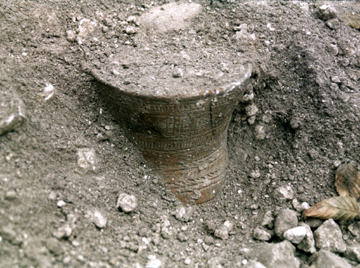
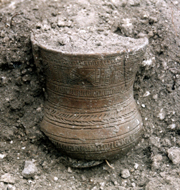
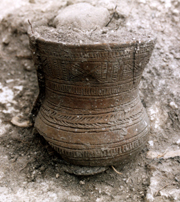
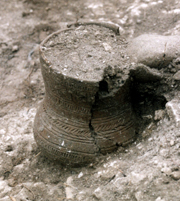
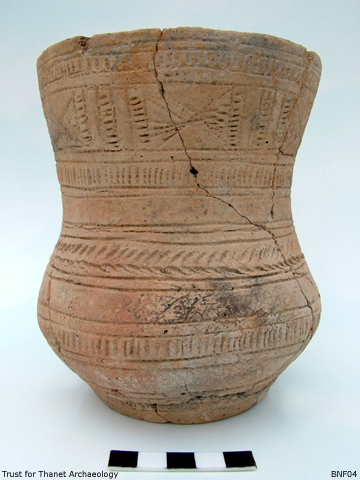
Type
Alex Gibson defined it as belonging to Clarke’s (1970) Developed Southern (S2) series; Step 5 or 6 of Lanting and van der Waal’s scheme (1972) and one of Case’s (1993) Southern Group B.
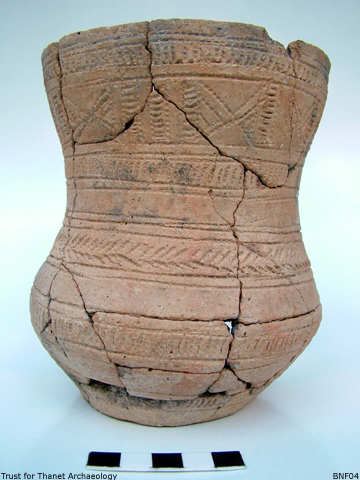
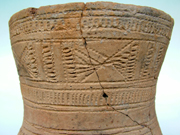
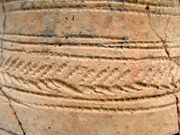
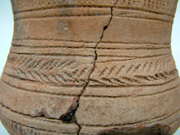
Fabric
The vessel's fabric (the clay from which it was made) was extremely hard and well-fired. It was finely grog-tempered with the sparse addition of small burnt flint fragments. The surfaces were light brown in colour with some occasional grey patches and a black core; these are characteristics indicating rapid but complete open firing.
The vessel's fabric (the clay from which it was made) was extremely hard and well-fired. It was finely grog-tempered with the sparse addition of small burnt flint fragments. The surfaces were light brown in colour with some occasional grey patches and a black core; these are characteristics indicating rapid but complete open firing.
Possible
traces
of coil or ring-building could also be seen.
Top
Decoration
Decoration
The vessel was made of a
fine fabric but it was not decorated to the highest quality. Some of
the motifs were carelessly executed on occasion.
The decoration had been
impressed into the surface of the clay, likely using two combs
with square-sectioned teeth. One longer
comb may have been approximately 50mm long; a shorter comb of oval
profile (though
this is not certain) might also have been used .
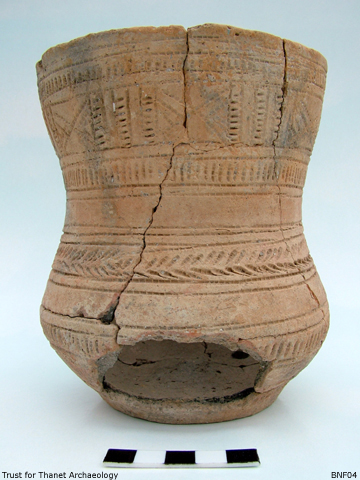
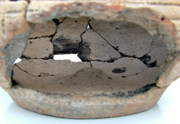
Note the raised centre
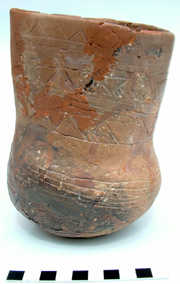
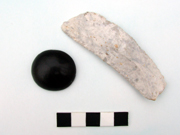
Jet button and flint knife grave-goods from the
Manston Runway Approach Beaker burial
A similar though poorer
quality vessel than the Beauforts Beaker was also discovered in the
central burial of a
roundbarrow, under the approach to Manston Airport (MRA87; Perkins and
Gibson 1990; Jay 1995).
That burial comprised the crouched inhumation of a slightly built adult, probably laid within a wooden coffin-structure and placed on their left-hand side, facing east. The body was accompanied by a jet button, with a simple flint knife-blade being recovered from the fill just above the skull.
The Manston remains were radiocarbon dated to 2132-1922 BC (68%); (BM-2642); (Perkins and Gibson 1990). The Beauforts burial has produced a radiocarbon-date of 2290-2190 BC (64.3%) / 2350-2130 BC (94.4%); (Wk 18732).
This earlier date for the Beauforts Beaker is still within the range for S2 Beakers nationwide. A comparative list of dates for S2 Beakers produced by Alex Gibson for his report on the Manston Beaker (Perkins and Gibson 1990) shows dates ranging from 2564-2209 BC (Wetwang Slack 8; HAR 4426), to 1880-1637 BC (Ysgwennant; Birm 85). The Beauforts Beaker does appear to be towards the earlier side of the range though.
That burial comprised the crouched inhumation of a slightly built adult, probably laid within a wooden coffin-structure and placed on their left-hand side, facing east. The body was accompanied by a jet button, with a simple flint knife-blade being recovered from the fill just above the skull.
The Manston remains were radiocarbon dated to 2132-1922 BC (68%); (BM-2642); (Perkins and Gibson 1990). The Beauforts burial has produced a radiocarbon-date of 2290-2190 BC (64.3%) / 2350-2130 BC (94.4%); (Wk 18732).
This earlier date for the Beauforts Beaker is still within the range for S2 Beakers nationwide. A comparative list of dates for S2 Beakers produced by Alex Gibson for his report on the Manston Beaker (Perkins and Gibson 1990) shows dates ranging from 2564-2209 BC (Wetwang Slack 8; HAR 4426), to 1880-1637 BC (Ysgwennant; Birm 85). The Beauforts Beaker does appear to be towards the earlier side of the range though.
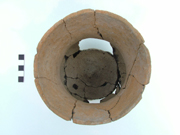
Gibson notes that S2
Beakers are rare in Kent. He also notes that the vessel is not of high
quality, despite the fineness of the fabric and that this 'confirms
Boast's observation that it is not always the high quality vessels that
are selected for burial and it may be the poorer ones that are selected
more often (Boast 1995)'.
The fact that the Beaker is
broken and incomplete may also be of
significance. It may suggest the possibility of the intentional
'killing'
of the vessel through deliberate damage; allowing it to share the same
'change in status' as that of the individual within the grave (Gibson
2005).
Gibson notes that the
mortuary rituals of the Beaker Period and Early
Bronze Age appear more complex than previously thought, with the
recognition that the human bones may have been subjected to post-mortem
treatment such as excarnation, sorting and cremation; while
grave-good vessels may be buried complete (sometimes as heirlooms?),
damaged, incomplete or be represented by only a handful of sherds as a
'token' burial (as a small scatter of human bone may likewise represent
a 'token' burial; Gibson 2005).
Boast R. 1995. Fine Pots, Pure Pots, Beaker Pots. In Kinnes I. and Varndell G. (eds) Unbaked urns of Rudely Shape. Essays on British and Irish Pottery for Ian Longworth, 69-80. Oxford: Oxbow Books.
Case H.J. 1993. Beakers: Deconstruction and After. Proceedings of the Prehistoric Society 59, 241-68.
Clarke D.L. 1970. Beaker pottery of Great Britain and Ireland. Cambridge University Press.
Gibson A. 2005. The Beaker and Other Pottery in Hart P.C. ‘Beauforts’, North Foreland Avenue, Broadstairs, Kent. Trust for Thanet Archaeology report, Part 3.
Lanting J.N. and van der Waals J.D. 1972. British Beakers as seen from the Continent. Helinium 12.
Perkins D.R.J. and Gibson A.M. 1990. A Beaker burial from Manston, near Ramsgate. Archaeologia Cantiana CVIII, 11-27.
Many thanks go to Alex Gibson for
his reports on not just this but all
of Thanet's Beaker vessels (barring a couple of examples, which remain
uncertain and unconfirmed at present).
Version 1 - Posted 16.12.06
All
content © Trust for Thanet Archaeology